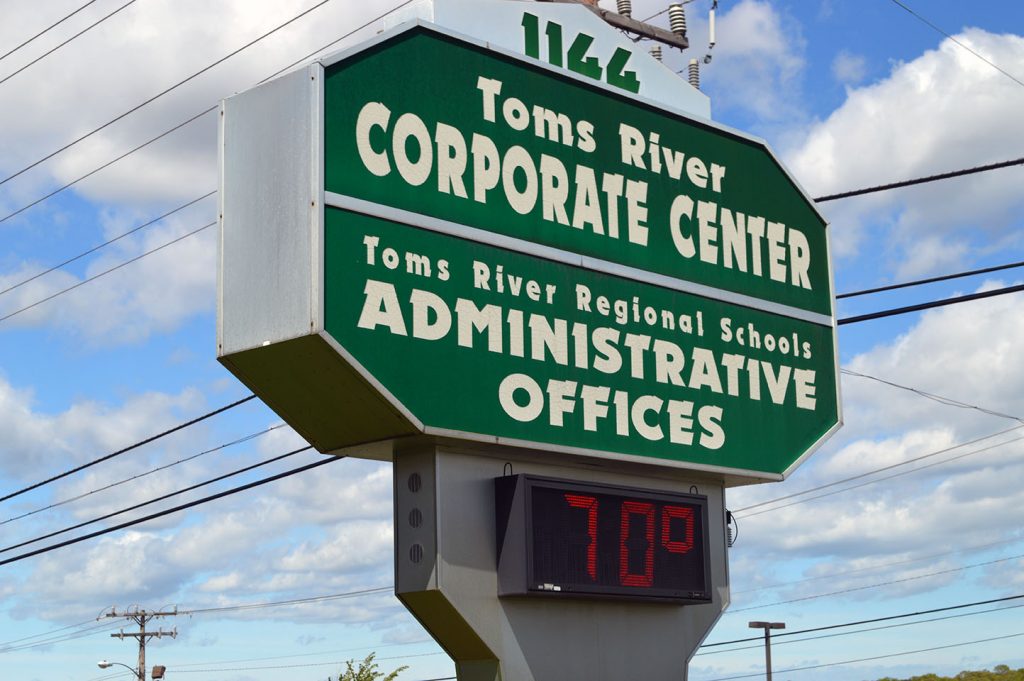
Toms River Regional (TRRS) Board of Education headquarters. (Photo: Daniel Nee)
The Toms River Regional school district is considering holding a special referendum vote in October that could cost $100,000 or more despite the fact that there would be no cost to add the question on school funding to the general election ballot a month later.
While the date and scope of the potential referendum vote – which could total up to $160 million – are still undetermined, one township resident questioned the motives behind holding the vote on a Tuesday in October rather than four weeks later, when presumably more voters would turn out at the polls.
“Why does this have to be a special election?” asked Toms River resident Dennis Galante at Wednesday night’s Board of Education meeting. “If I look at Oct. 2, I see it as you keeping it out of the general election. I also see the fear as to why you would not run this in the general election, because when you get each and every person to get out and vote … we had this four or five years ago, it was defeated.”
Some residents have quietly questioned the stated goal of holding the vote in October. In past referendum votes in Toms River, there were allegations of flyers being passed around school properties promoting a ‘yes’ vote, Galante said.
The referendum will include more than $100 million worth of improvements to all of the district’s 18 schools. Officials have said drastic repairs are necessary to heighten student safety, serve disabled students’ needs and improve both the mechanical and aesthetic feature of each school building. A list of sample items included in the referendum vote was divulged during a public information session earlier this month.
Galante, specifically, took issue with a statement made by Board President Russel Corby, who said “plan B,” if the referendum is voted down, would cost more for taxpayers. Galante said he hoped the statement would not be construed as a threat. Under state law, board members must remain neutral and neither advocate for, or lobby against, a referendum.
Corby did not elaborate on what “plan B” would consist of, but indicated that if the vote fails, the district could be forced to borrow for improvements.
“I think it is logical to believe that the longer you let these projects go down the road – we already hear about interest rates going up – the more expensive they become,” said Corby, a former Democratic mayor of Pine Beach.
The idea of a referendum sparked some debate at the meeting, even for one resident who said she would normally support a measure that funds school improvements.
“There really is an issue here of, ‘why am I going to give you more of our money?’” said Krista Whittaker, of South Toms River.
Corby called the funding of school improvements a “generational issue.”
“If it doesn’t go through, it is like those people in Washington and Trenton who keep kicking the can down the road,” he said. “This is very much a generational issue. We all must remember that someone in a past generation put up the money to build those schools, and they sacrificed in their generation. In the ‘60s, ‘70s and ‘80s, when the population was booming in Toms River, there were many schools that had to be built, and the people did what they had to do. This is the same question.”
Galante, however, said New Jersey’s highest-in-the-nation property taxes led him to oppose new taxation.
“Prosperity in New Jersey is declining, particularly in Ocean County,” he said. “With the referendum, taxes will be increasing again, probably creating more foreclosures, and I want to understand how taxpayers can afford this.”
William Doering, the district’s business administrator, has said he expects the state may contribute up to 40 percent of the funding if the referendum receives voters approval. For a hypothetical $100 million referendum with the state covering 30 percent (as a conservative estimate), the average tax increase would be about $96 per year for 20 years, the length of the bonds that would be utilized for the funding.
Doering said the last time the district held a referendum on a date other than that of the general election, taxpayers funded it to the tune of between $80,000 and $90,000.
“I would expect around $100,000” this time, he said.


Police, Fire & Courts
Toms River Police Catch Well-Known Suspect Attempting to Burglarize Vehicles

Police, Fire & Courts
Fatal Toms River Hit-and-Run Results in Charges Against Local Man, 68

Police, Fire & Courts
Foursome Accused of Dismembering Body Following Murder of Toms River Man







